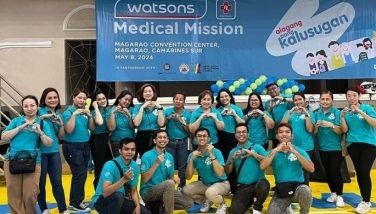AsPac employers realign retirement programs
June 30, 2006 | 12:00am
An aging workforce is forcing employers in the Asia Pacific region, including the Philippines, to realign their retirement benefit programs, a regional survey showed.
At the same time, the insufficiency of government pension and health programs, particularly in the Philippines, is encouraging employees to seek other sources of retirement and health programs.
In a survey done by Watson Wyatt Worldwide, a global human capital and financial management consulting services firm, the population of individuals 60 years and older in the region will grow to one billion by 2025.
In contrast, the fertility rate is dropping by an alarming 25 percent since 1995.
This is particularly true for developed countries in the region, where the workforce is getting older but the younger generation is actually shrinking.
"That offers potential employment and growth opportunities for the Philippines, Indonesia and India which have a younger workforce compared to Japan and Korea, not to mention Europe and the Americas," Bob Charles, Watson Wyatt Asia Pacific head for retirement benefits practice, said in a presentation yesterday.
The 50-year and above workforce in the Philippines is roughly 13 percent of the total population which is expected to grow to 21 percent by 2030, and to 30 percent by 2050. In contrast, the same age group in Japan is already 41 percent of its present population, expanding to 51 percent by 2030.
Charles explained that the opportunities are not only in overseas employment for skilled Filipino workers, which is growing by an annual average of 20 percent.
"The country’s relatively younger workforce has greater potentials for productivity for the Philippines’ economic growth. The same age group helped spur growth in Japan, Hong Kong, Singapore, and Korea," he added.
The survey also shows that employers are concerned about the reduction in labor supply. It has forced them to increase training programs for improved productivity, to adopt technology to replace labor, to encourage healthier lifestyles, and even extend the retirement age of employees.
"But the winners in coping with the aging workforce are economies that can adjust to a greyer (older) world, and can manage their retirement and healthcare costs," the study stressed.
Focusing on the Philippines, only 35 percent of those surveyed believe that social security benefits will be adequate for their employees. It magnifies the perception that government does not, and can not, offer sufficient retirement and pension programs for its aging population. Adding to the burden is the heavy foreign debt burden and fiscal constraints that limit government’s ability to service its population.
Emphasis on social services including retirement, pension and national savings, remain in the lower half of the government’s list of priorities.
The survey, which covered 227 companies from the top 2,000 companies, including local conglomerates and multinational corporations, show that 55 percent of employers believe that social security retirement system is unsustainable.
In fact, employers admit that they offer separate retirement and healthcare programs. But they also encourage their employees to seek other forms of pension, healthcare and savings instruments.
A particular concern expressed by the Watson Wyatt survey is the slow breakdown of inter-generation support, a trait particularly evident in Asian families.
Charles explained that as the workforce grows older but remain employed, the younger generation of employees can not rely on support from parents or relatives as had been recorded in previous generations.
At the same time, the insufficiency of government pension and health programs, particularly in the Philippines, is encouraging employees to seek other sources of retirement and health programs.
In a survey done by Watson Wyatt Worldwide, a global human capital and financial management consulting services firm, the population of individuals 60 years and older in the region will grow to one billion by 2025.
In contrast, the fertility rate is dropping by an alarming 25 percent since 1995.
This is particularly true for developed countries in the region, where the workforce is getting older but the younger generation is actually shrinking.
"That offers potential employment and growth opportunities for the Philippines, Indonesia and India which have a younger workforce compared to Japan and Korea, not to mention Europe and the Americas," Bob Charles, Watson Wyatt Asia Pacific head for retirement benefits practice, said in a presentation yesterday.
The 50-year and above workforce in the Philippines is roughly 13 percent of the total population which is expected to grow to 21 percent by 2030, and to 30 percent by 2050. In contrast, the same age group in Japan is already 41 percent of its present population, expanding to 51 percent by 2030.
Charles explained that the opportunities are not only in overseas employment for skilled Filipino workers, which is growing by an annual average of 20 percent.
"The country’s relatively younger workforce has greater potentials for productivity for the Philippines’ economic growth. The same age group helped spur growth in Japan, Hong Kong, Singapore, and Korea," he added.
The survey also shows that employers are concerned about the reduction in labor supply. It has forced them to increase training programs for improved productivity, to adopt technology to replace labor, to encourage healthier lifestyles, and even extend the retirement age of employees.
"But the winners in coping with the aging workforce are economies that can adjust to a greyer (older) world, and can manage their retirement and healthcare costs," the study stressed.
Focusing on the Philippines, only 35 percent of those surveyed believe that social security benefits will be adequate for their employees. It magnifies the perception that government does not, and can not, offer sufficient retirement and pension programs for its aging population. Adding to the burden is the heavy foreign debt burden and fiscal constraints that limit government’s ability to service its population.
Emphasis on social services including retirement, pension and national savings, remain in the lower half of the government’s list of priorities.
The survey, which covered 227 companies from the top 2,000 companies, including local conglomerates and multinational corporations, show that 55 percent of employers believe that social security retirement system is unsustainable.
In fact, employers admit that they offer separate retirement and healthcare programs. But they also encourage their employees to seek other forms of pension, healthcare and savings instruments.
A particular concern expressed by the Watson Wyatt survey is the slow breakdown of inter-generation support, a trait particularly evident in Asian families.
Charles explained that as the workforce grows older but remain employed, the younger generation of employees can not rely on support from parents or relatives as had been recorded in previous generations.
BrandSpace Articles
<
>
- Latest
- Trending
Trending
Latest
Trending
Latest
Recommended





























